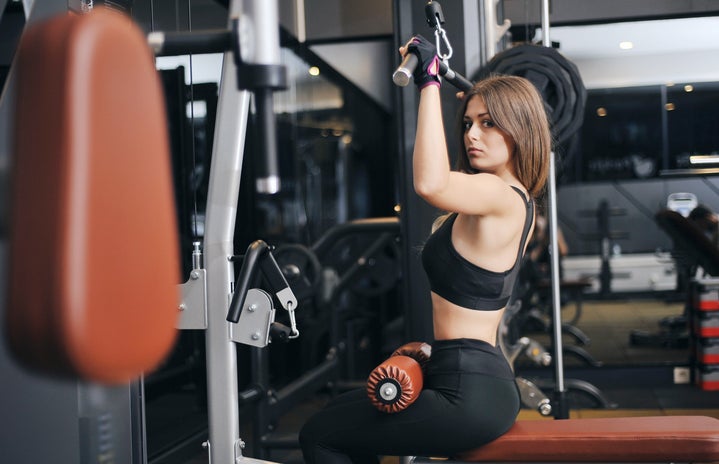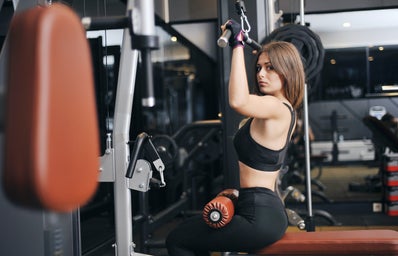Hi everyone, happy new year, and happy new semester!
Every January 1st, people set off with intentions to better themselves in the new year. They vow to eat healthier, swear off junk food and take out, and sometimes take on fitness challenges. I was at the gym in my hometown over break and overheard one of the personal trainers discussing with another how she’ll be doing the 75 Hard Challenge starting this month. 75 Hard is a challenge that lasts for that many days, and consists of dieting, trying not to have cheat meals, working out twice a day, drinking a gallon of water daily, reading nonfiction, and some other self-improvement activities. At face value, there’s nothing all that questionable in this challenge, but – like many other “fitness challenges” – 75 Hard is imperfect.
The first concern for me is that the creator of 75 Hard, Andy Frisella, is not a certified personal trainer or dietician (Vincent). Additionally, it’s a pretty vague challenge, encouraging participants to “diet” but not elaborating on what that diet could mean, and challenging them to two 45-minute workouts a day – also not elaborating on what kind of workouts to try. A combination of a caloric deficit diet and two intense workouts a day does not constitute “fitness” or good health.
There’s nothing wrong with wanting to challenge yourself to have a healthier mindset in the new year; I am in your corner if you’re working on taking better care of your health this year! But I do want to encourage you to find a sustainable approach to health, which many “challenges” do not take.
There are two common mistakes that I’ve seen people make when it comes to how they view health. Keep in mind that I am not an expert of anything; these are just my observations and personal thoughts.
- Misunderstanding what it means to eat “healthy”
The first mistake so many of us tend to make is seeing “thin” and “healthy” as synonymous, and “fat loss” and “fitness” to be the same things. We glorify the “disciplined” people who never eat a “cheat meal,” and, in doing so, reinforce the idea that good health can only be obtained through restrictive diets.
Being healthy does not mean you have to be miserable. It does not mean you have to stop eating your favorite foods or counting calories, painstakingly measuring every teaspoon of ketchup you use. If you’re out with friends and want to get pizza or ice cream or a burger with them, I encourage you not to see that as a cheat meal. Instead, see it as food, something that will nourish your body, make you happy, and see it as an opportunity to have fun with your friends. That food will fuel your next walk, workout, bedroom dance party. Eating healthy does not equate to restricting foods.
For some food inspiration and more on having a healthy relationship with food and fitness, I’d recommend the following blogs and Instagram pages!:
- Wife Mama Foodie: A vegan blogger with lots of yummy baked goods and meal ideas; feel free to substitute vegan/vegetarian options with whatever ingredients you prefer (dairy, alternate flours, etc.) https://www.wifemamafoodie.com/
- Taylor Olsen: Taylor is a trainer, YouTuber, and social media influencer; she hosts a Podcast with Sam Taylor – The F Word: Fitness Uncensored – where they discuss misunderstandings and flaws in the fitness industry. YouTube: Taylor Olsen, Instagram: @ttaylorolsen
- Sam Taylor:Sam is a trainer, YouTuber, social media influencer, and Taylor’s co-host on The F Word podcast. While Taylor is vegan, Sam eats both vegetarian and carnivorous foods. YouTube: Sam Taylor, Instagram: @ssam.ttaylor
- MadFit: Maddie is a Youtuber, former dancer, and fitness guru. I’ve written about her and her workout programs in the past, but she also posts lots of Full Day of Eating reels and has some older recipe videos on YouTube. She east semi-vegetarian. YouTube: MadFit, Instagram: madfit.ig.
- Liz King:Liz is a CPT and social media fitness influencer. Her content is great at encouraging us to look at fitness from a perspective that emphasizes feeling good, feeling strong, and having fun. Similar to The F Word podcast, her content calls out toxic tendencies of the fitness industry. Instagram/TikTok: @madeformefitness.
2. We sacrifice sustainability for speed
The second mistake is that we are impatient; we want challenges like Chloe Ting’s “Abs in 2 Weeks” to work in 2 weeks, maybe we want to lose some fat before swimsuit season, we want bigger muscles before it’s tank top weather.
I’ve already alluded to this, so I’ll keep it brief, though I could go on and on about this topic! You cannot rush “health,” and challenges that suggest otherwise often do not give participants long-lasting results. You may see some immediate changes to your body, but they won’t last unless you continue with the routine you’ve been doing. This is where my problem with 75 Hard really comes in… 75 Hard might not be a bad way to challenge yourself to do something for that (relatively) short amount of time. But it’s not a routine that is going to be easy to sustain long-term. 75 Hard is definitely worth trying as a way to push yourself to do something new, but it’s not a good way to introduce yourself to fitness, especially if you’re hesitant to do so, to begin with.
There are better, simpler ways to approach fitness as a beginner. Start by setting a goal to “workout” X number of times a week for X minutes. As opposed to two 45-minute workouts a day, consider 30 minutes of movement every day. Or an hour-long workout 4 days of the week. Instead of telling yourself, you need to go to the gym or go for a run, which may be intimidating, you can take a walk, try a yoga video, play Just Dance, etc. Something that sounds fun and gets you moving.
Rather than swear off all foods you think of as “junk,” set a goal to try cooking something new, using fresh and whole ingredients.
You might not see yourself having a flat stomach in a few weeks; you might not notice much of a difference in your physique at all after a short amount of time. But I am confident that you’ll feel better. I’m confident your relationship with food will begin to improve, and you will start finding what kind of movement or exercise makes you feel good and fulfilled.
In 2022, I encourage you to pursue your health and wellness goals, both physical and mental. I encourage you to take it slow and be gentle with yourself. Don’t compare your week one to someone else’s year 2. And whatever you do, wherever your fitness journey takes you, make sure you do it for yourself and to feel good! Not for any other reason.
Happy New Year, everyone, sending you love and support <3


